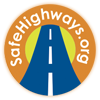Troopers Talk
State Law Enforcement Agencies on Safety Service Patrols’ “Invaluable Assistance” During Natural Disasters
By Sarah Stanley
On the road and in the face of a natural disaster, there are few more critical partnerships for Safety Service Patrols (SSP) than the partnership they have with the local law enforcement. From state to state, SSPs are receiving high marks on their response efforts during natural disasters from one of their biggest advocates: state troopers.
In Florida, “the Road Rangers are often the first responders to the scene,” says Sergeant Kim Montes, Public Affairs Officer for the Florida Highway Patrol (FHP) Troop D in Orlando. “They stabilize the scene by being visible – allowing motorists to see that something is going on – and then assisting law enforcement.” Not only is this prompt response important during incidents, but also for motorists in need of assistance. “During [severe] weather conditions, the last thing that we want is someone stranded on the highway,” she adds.
Lieutenant Colonel G. L. Bell, Director of Field Operations, North Carolina State Highway Patrol, offers a similar view in regards to his state’s Incident Management Patrol (IMAP). During evacuations, “IMAP has often times been the first on the scene of a motor vehicle collision and provided vital information to the State Highway Patrol Communications Centers as to injury status and traffic conditions,” explains Lieutenant Colonel Bell, “which allowed Emergency Medical Services to be contacted immediately for a quick response.” This communication is via the Highway Patrol’s 800 MHZ Voice Interoperability Plan for Emergency Responders (VIPER) system. This system allows law enforcement, Department of Transportation, Fire/Emergency Medical Services and Emergency Management to communicate utilizing a statewide radio system. “The State Highway Patrol strives to continue a strong partnership by sharing resources especially during pending natural disasters such as a hurricanes,” adds Lieutenant Colonel Bell.
Sharing resources is the norm in New Jersey where the State Police are co-located with the Department of Transportation. The State Police and SSP work hand-in-hand as an Incident Management Team on anything that may potentially shut down the highway. Following Hurricane Sandy, the first responders worked together to remove downed poles, wires and trees to reopen the roadway. Lieutenant Frank Manghisi of the New Jersey State Police recalls, “There were so many calls the first few days … everyone responded as the professionals they are.” He notes that as the SSP has been developing over the last few years “We’re working on all cylinders and we now rely upon them as much as they rely upon us.”
“In a natural disaster, whatever the case may be, emergency response folks are tied up with all kinds of activity and don’t necessarily have the resources for traffic control,” says Jack Sullivan, Director of Training at the Emergency Responder Safety Institute. “They depend on the SSPs for that early on.” Sullivan suggests the best way for SSPs to prepare and to maintain this level of service is to work together with partner agencies outside of incidents. The Emergency Responder Safety Institute encourages the development of local TIM (Traffic Incident Management) or task groups that meet on a regular basis. “People get to know each other by name and recognize each other on the street,” Sullivan adds. “Once they understand what everyone is doing, things tend to operate more smoothly on the road.”
Feeling spoiled by all the ways Road Rangers provide assistance, Sergeant Montes reflects back on the beginning of her career with FHP when the program was not yet available. “How did we ever do things without them?” she asks rhetorically. She is not alone in that sentiment. In fact, the word “invaluable” is consistent among partner agencies when asked to describe their state SSP’s service during natural disasters.
